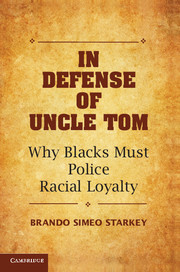Description
In Defense of Uncle Tom
Why Blacks Must Police Racial Loyalty
Author: Starkey Brando Simeo
This book shadows the usage of 'Uncle Tom' to understand how social norms associated with the phrase were constructed and enforced.
Language: English
Subject for In Defense of Uncle Tom:
Approximative price 84.66 €
In Print (Delivery period: 14 days).
Add to cart
Publication date: 01-2015
372 p. · 15.5x23.1 cm · Hardback
372 p. · 15.5x23.1 cm · Hardback
Description
/li>Contents
/li>Biography
/li>
'Uncle Tom' is the most piercing epithet blacks can hurl at one another. It marks targets as race traitors, and that painful stain is often permanent. Much more than a slur, Uncle Tom is a vital component of a system of social norms in the black community that deters treachery. In this book, Brando Simeo Starkey provocatively argues that blacks must police racial loyalty and that those successfully prosecuted must be punished with the label Uncle Tom. This book shadows Uncle Tom throughout history to understand how these norms were constructed, disseminated, applied, and enforced. Why were Martin Luther King, Jr, Marcus Garvey, Muhammad Ali, Jackie Robinson, Thurgood Marshall and others accused of racial betrayal? In Defense of Uncle Tom answers this and other questions and insists that Uncle Tom is too valuable to discard. Because it deters treachery, this epithet helps build black solidarity, a golden tool in promoting racial progress.
1. Solidarity, social norms, and Uncle Tom; 2. Uncle Tom: 1865–1959; 3. The unwitting pioneers; 4. Uncle Tom: 1960–75; 5. No man was safe; 6. Uncle Tom today: 1976–present; 7. So what about Clarence?; 8. The curious case of Uncle Tom; 9. What now, Uncle Tom?
Brando Simeo Starkey is a writer and scholar. He holds degrees from Ohio State University and Harvard Law School. He was a postgraduate Research Fellow at Harvard Law and a Constance Baker Motley Fellow at the Equal Justice Society, and he previously taught law at Villanova Law School and the Thomas Jefferson School of Law.
© 2024 LAVOISIER S.A.S.

